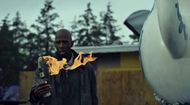Taron Egerton’s Smoke is shaping up to be more than just a slow-burn crime drama, it’s a psychological puzzle hiding in plain sight. At the heart of it all is Dave Gudsen, an arson investigator whose life takes a dark turn, not just because of the fires he’s chasing, but the story he’s secretly writing. In the first two episodes, viewers are introduced to Dave’s ongoing novel project. What initially seems like a cathartic creative outlet quickly becomes something far more personal and dangerous.
As the Apple TV+ show unfolds, we learn that Dave’s book centers on an unnamed arsonist who burns things not for money, revenge, or even thril, but out of contempt for people who seem too happy. It’s a chilling premise, especially coming from someone who’s supposed to be solving these exact crimes. The twist? Dave is one of the arsonists he’s hunting alongside Detective Michelle Calderone.
The reveal lands like a gut punch at the end of episode 2. What was first presented as fiction turns into a thinly veiled confession. But the true genius of Smoke is how the novel doesn’t just mirror Dave, it also reflects another arsonist on the loose, suggesting the book may be doing more than we think.
A character study disguised as fiction

The most unsettling part of Dave’s novel is the psychology behind it. His arsonist character targets people who appear joyful and content, believing they somehow deserve to suffer. This hatred of happiness echoes real-life behavior from Freddy Fasano, another arsonist introduced in the series. In episode 1, Freddy watches a couple enjoying themselves, then later burns their house down. Viewers are given a direct quote from Dave’s book during this sequence, where the fictional arsonist expresses a similar disgust toward “people who think life is good.”
At first, it seems like Dave is drawing from his past investigations, pulling fragments of real-life cases into his fiction. But the deeper the show goes, the clearer it becomes: the novel is just as much about Dave’s own worldview. That makes the book a reflection of his crimes, his mindset, and potentially even a way to process or rationalize what he's done.
Freddy’s actions align with Dave’s writing in Smoke

What makes the novel even more fascinating is how well it mirrors the actions of Freddy Fasano. Both Freddy and the character in Dave’s book burn for similar reasons: jealousy, anger, resentment. Freddy doesn’t fit the typical profile of a criminal mastermind, he’s a fast-food worker quietly navigating life until he strikes. Yet his reasons for arson aren’t random. Like Dave’s literary character, Freddy’s actions stem from deep-seated emotional turmoil.
In episode 2, Freddy even begins a journey of self-improvement, getting a haircut and prepping for a managerial job interview. It’s a seemingly mundane subplot, but one that may come to mirror changes in Dave’s novel. If the character in Dave’s book also goes through a transformation, the show could be setting up a deeper connection between the two arsonists. One fictional, one very real.
Smoke doesn’t just give us a crime to solve, it invites us inside the mind of the man who’s both chasing and committing it. And his book? It might just be the most honest thing he’s ever written.
